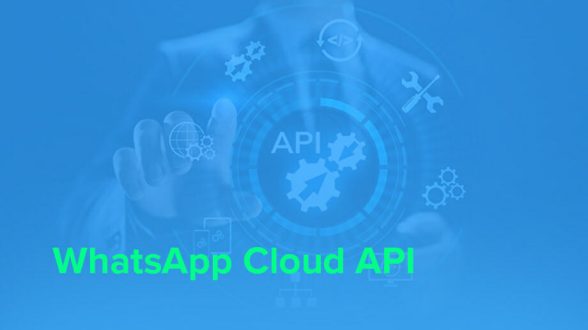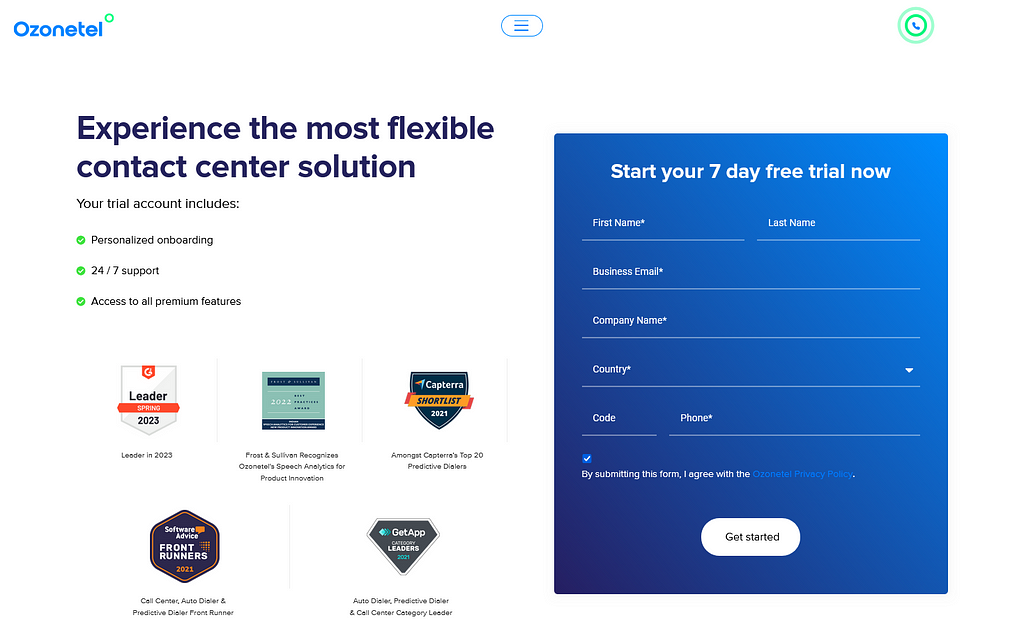- Resources
- WhatsApp Cloud API: Everything You Need to Know (2024)
WhatsApp Cloud API: Everything You Need to Know (2024)

Every business aims to connect with customers, partners, and the public in a meaningful way — and WhatsApp has given businesses a new channel to achieve this. Today, according to WhatsApp data, 155Milion people message business on daily. And the WhatsApp Cloud API is one way that brands can manage these customer conversations at scale.
Launched in May 2022, WhatsApp Cloud API is a cloud-hosted version of the WhatsApp Business API. Hosted by its parent company Meta, the API enables a business or a developer to access its service, build directly on the WhatsApp Platform to customize their experience, and respond to customers quickly.
The Cloud API helps partners eliminate costly server expenses and also reduces the integration time from weeks to minutes. Here is a quick primer on how the API works and how you can use it to your advantage.
In this article, we will explore:
- 1. Understanding WhatsApp Cloud API
- 2. Introducing the New Cloud API
- 3. WhatsApp Cloud API Features and Functionalities
- 4. How to Get Started with WhatsApp Cloud API
- 5. WhatsApp Cloud API Pricing
- 6. How Does the WhatsApp Cloud API Differ From the WhatsApp Business On-premises API?
- 7. Using WhatsApp Cloud API: The Advantages
- 8. Using WhatsApp Cloud API: Limitations
- 9. How to Make the WhatsApp Cloud API Work Better: Choose A Platform with Omnichannel Capabilities
- 10. About Ozonetel’s CCaaS Platform on WhatsApp
Understanding WhatsApp Cloud API
Before the WhatsApp Cloud API launch, Meta had three variants including WhatsApp (for non-commercial purposes), WhatsApp Business (for small businesses), and WhatsApp Business API for companies wanting to benefit from advanced features such as CRM integration, sending unlimited messages, and automation among others. WhatsApp Cloud API has the functionalities like the Business API, but it is hosted in the cloud on Meta’s servers.
Why is WhatsApp an important customer engagement channel?
WhatsApp’s strong market share may partially be due to features like its historical mobile-first model, end-to-end encryption, and support for phone-number-linked user accounts, but the freemium business model also has a lot to do with the platform’s success.
Speaking at a webinar on WhatsApp’s role in improving customer engagement, WhatsApp’s Channel Partner Lead, India, Arzan Singpurwalla underscored the growing importance of business messaging and shared why WhatsApp has become a preferred channel of customer engagement.
“Nearly 85% of internet users in India use WhatsApp (around 600 million). It’s a place where consumers have the highest online presence. Brands want to leverage this opportunity & choosing WhatsApp over traditional channels like SMS, emails, etc. They want to expand their presence from big cities and get more visibility in towns & villages where the majority of the Indian population lives,” he said.
The Enterprise Perspective
In the business arena, WhatsApp serves many purposes. Companies use it to respond to customer questions and complaints quickly, share promotional messages and coupons, follow up with leads after sales calls, and even communicate with employees about company news, updates, and performance reviews.
Making Use of Channels
One crucial concept to understand is that of channels: On WhatsApp, channels are a way for businesses to communicate with their customers in an organized fashion.
You can use channels to send out updates, special offers, or general information. Customers can subscribe to a channel by adding the business’ WhatsApp number to their contact list, making these engagement pathways an easy way to promote ongoing communication.
Introducing the New Cloud API
The WhatsApp Cloud API is a new feature that lets businesses take charge of how they send and receive messages using WhatsApp. It lets companies communicate with their customers and partners more fluidly while tracking metrics and analytics related to engagement.
So how is this different from the previous WhatsApp Business API?
Make no mistake, the Cloud API is indeed a distributed version of the existing WhatsApp Business API. It still lets your team build custom user experiences on top of WhatsApp to integrate the messaging service with your bespoke business backend. However, it is hosted on Meta’s servers out in the cloud instead of on a private server operated by your company or a Business Service Provider (BSP).
On a related note, you no longer have to go through an official Meta-approved third party to use the enterprise-level feature set. Instead of hunting for a dependable WhatsApp BSP or Partner, you can dive into the API yourself, closing the gap between your operational goals and the custom business systems that help you achieve them.
But being able to roll your own WhatsApp solution doesn’t necessarily mean you should. As we’ll cover later, there are still good reasons to work with BSPs to make your WhatsApp experience more efficient and impactful. Before we move into what these reasons are, let us explore the WhatsApp Cloud API features and functionalities.
WhatsApp Cloud API Features and Functionalities
The WhatsApp Cloud API can achieve a lot. Some of its biggest perks include:
As we mentioned above, your ability to leverage these features depends on how you use the Cloud API. While there’s nothing wrong with programming them yourself, you can get a big jump on things by building on someone else’s work instead.
- Enabling businesses to send and receive messages using the WhatsApp Business app
- Tracking metrics and analytics related to customer engagement
- Delivering custom experiences that leverage WhatsApp’s core functionality as a foundation
- Allowing businesses to create groups and channels for customer support or marketing purposes
- Automating responses to frequently asked questions
How to Get Started with WhatsApp Cloud API
To get started with WhatsApp Cloud API, businesses first need to sign up for a Facebook/Meta for Developers Account. From there, simply follow the prompts to create a new app using the console. If you don’t have a Business Manager account or you’re unsure what to fill in for this step, don’t worry – the system will automatically set you up, and you can always tweak your configuration later.
After creating a Business app, you should be routed back to the main Developer Dashboard. Find the WhatsApp icon, choose the setup option to go through the Terms and Conditions agreement, and you’re pretty much done.
The nice thing about this process is that you get to start experimenting immediately: You can test your new WhatsApp integration by using the provided dummy phone number to send a message to your company or personal account.
Alternatively, you can jump ahead to fill in your business contact info, adding your address, timezone, phone number, and other data. However, be careful not to use a phone number that’s already linked to WhatsApp.
WhatsApp Cloud API Pricing
The barriers to entry for using the WhatsApp Cloud API are extremely low. Not only does Facebook approve most business use cases in minutes, but you also don’t have to shell out any money for the privilege.
Getting access to the WhatsApp Cloud API account is free. Messages are charged per session, which means that you don’t have to pay additional per-message fees. A session consists of all messages exchanged between a business and a contact within a 24-hour period.
Conversation-based Pricing
There are two categories of conversation-based pricing:
User-initiated conversations: Businesses are charged when they respond to user messages within the 24-hour messaging window.
Business-initiated conversations: Businesses have to use a message template to start a business-initiated conversation & it is outside the 24-hour messaging window.
How Does the WhatsApp Cloud API Differ From the WhatsApp Business On-premises API?
The main distinction between the WhatsApp Cloud API and the WhatsApp Business on-premises API is that the WhatsApp Business on-premises API requires you to host your own infrastructure. If you want to use the WhatsApp Business API, you’ll need to have a server already or pay someone to configure and maintain one for you.
The WhatsApp Cloud API, by contrast, resides in the cloud – more specifically, on servers owned by Meta. While this has advantages and disadvantages, companies that want to take things for a test drive may find the cloud version more readily accessible, particularly since Meta foots the bill for your hosting and usage.
Another important difference is that using the WhatsApp on-premises API requires that you go through a third party, which isn’t really a straightforward pro or con. Again, finding an experienced BSP can smooth out a lot of the common stumbling blocks along the way despite the extra logistics.
Using WhatsApp Cloud API: The Advantages
If you want to make a mark with WhatsApp, you’re hardly alone, and you have plenty of good reasons to get on board. Some advantages of using WhatsApp Cloud API include:
Reduced Costs
As mentioned above, one of the key benefits of using WhatsApp Cloud API is that it eliminates the need for businesses to host their own infrastructure. Since you don’t have to pay for hardware or network upkeep, this can significantly reduce your startup and ongoing costs.
Free Messaging
WhatsApp Cloud API uses an existing messaging platform (WhatsApp). As such, there are no additional fees associated with sending or receiving messages.
Increased Public-facing Efficiency
Another advantage of using WhatsApp Cloud API is that it enables businesses to automate responses. For instance, imagine your retail customers commonly asked when specific products would be in stock. You could connect your WhatsApp integration to the same warehousing system that powered your online shopping cart software to provide accurate, instant responses and keep customers happy – or even prompt users to share their emails for automated restock updates. Never discount the value of freeing up time you’d otherwise spend responding to individual queries manually.
Streamlined Internal Communications
WhatsApp Cloud API is tech-stack agnostic – It doesn’t care which business management platforms you use, so you can integrate it with any tool you want. This can make it a lot simpler to communicate within your organization. For instance, you can build routing systems that automatically connect different departments or branches for heightened awareness of what’s happening in every corner of your enterprise.
High Customer Engagement
One of the key features of the WhatsApp Cloud API is its ability to track metrics and analytics related to customer engagement. You can use this information to improve future customer interactions by tailoring content and strategies to their needs. The fact that the data you get back is extremely fine-grained gives you a lot of power to create campaigns that really connect with audiences.
Using WhatsApp Cloud API: Limitations
Despite its many advantages, there are a few noteworthy gaps you’ll need to consider:
One of the major limitations of Cloud API is that WhatsApp parent Meta doesn’t provide a platform to use Cloud API. Unlike WhatsApp or WhatsApp Business, you are required to create an app or platform to access Cloud API and benefit from WhatsApp’s features.
You cannot use the same WhatsApp number for on-premise WhatsApp Business API & cloud WhatsApp API. However, you can transfer your phone number from the on-premise WhatsApp Business API to WhatsApp Cloud API.
With WhatsApp Cloud API, you won’t have access to the analytics data on your business. As a business owner, you need data to make informed decisions. In absence of relevant data, businesses can make costly mistakes.
How to Make the WhatsApp Cloud API Work Better: Choose A Platform with Omnichannel Capabilities
If you intend to use WhatsApp Business Cloud API for your business, there are a few things you can do to make the experience more pleasant – for your company as well as your customers.
First, remember that WhatsApp is primarily a mobile app – so make sure your marketing strategy focuses on mobile users. Second, take advantage of WhatsApp’s unique capabilities, such as its group chat feature, to create a more personal experience for your customers. Finally, consider using a platform like Ozonetel CCaaS platform on WhatsApp to achieve true omnichannel communication.
Effective communication depends on contextual awareness – You have to know what the conversation’s really about to keep up, and you can’t do that if you’re only focused on one isolated thread of the dialogue. The WhatsApp Cloud API’s functionalities may be great at keeping customers engaged, but as an enterprise user, you cannot overlook its limitations.
Among the sea of business service providers, it’s not easy to find third-party support that truly understands your needs. Ozonetel’s CCaaS Platform on WhatsApp is a first-of-its-kind innovation aimed at unifying the WhatsApp outreach experience with all your other marketing and communication efforts. Ozonetel’s one-click embed flow allows businesses to set up their WhatsApp contact center within five minutes. Besides, businesses can bring their existing phone number onto the WhatsApp channel.
They can even bring their own phone number if needed. It integrates fluidly with your contact centers and makes it effortless to design conversational flows for heightened engagement, seamless bot-to-agent handoffs, and AI-powered skill routing. Even better, it keeps your agents informed – no matter where they pick up the conversation, the Ozonetel toolbar lets them get involved in an organic manner that promotes client satisfaction.
Given the huge popularity of WhatsApp in the consumer market, it’s highly likely the platform will continue to grow in popularity despite its limitations.
About Ozonetel’s CCaaS Platform on WhatsApp
Ozonetel offers businesses a comprehensive CCaaS Platform on WhatsApp. It offers all the features you need to set up and scale your WhatsApp sales, marketing, or customer service campaigns including AI-based automation, skill-based routing to human agents, and deep CRM integrations. You can get started with your existing virtual phone numbers, seamlessly integrating WhatsApp into your current contact center processes with minimal investments.
Ready to take control of your call transfer
experience for better CX outcomes?
Nirmala
Senior Newswriter at Ozonetel
Creative Content Editor with extensive project experience from concept to development. Talents inclu...







